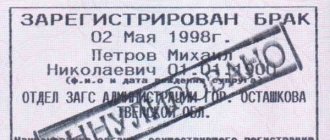Inheritance is regulated by law, in particular, Ch. 3 Civil Code of the Russian Federation. And it lists all possible grounds for preventing a person from inheriting or removing him from the property of the deceased. And there are quite a few of them. In this article, we will look at how to disinherit, how to disinherit an unworthy heir, and why you need the help of a lawyer in Moscow.
- Grounds for removal
- Deem unworthy
- Presence of priority heirs
- Exception from will
- Why are people disinherited?
- Legal assistance
Categories of citizens for recognition as unworthy
All subjects who fall into the category of unworthy heirs are divided into four groups:
- citizens who have committed unlawful acts against the testator, other claimants to the inheritance and their descendants. This point is spelled out in a separate article. 1117 of the Civil Code of the Russian Federation. This also includes murder, attempted murder, causing intentional harm and other actions that pose a threat to the health, life or property of other participants in the process;
- persons who tried to obtain an inheritance dishonestly. This includes preventing the legal heirs from receiving the property of the deceased, unauthorized changes in the share of the inheritance, and unacceptable influence on the will of the testator. If these actions are proven in court, persons of the first category will be deprived of the right to inheritance;
- Unworthy heirs also include citizens who have lost their parental rights by court decision. Such unscrupulous parents cannot receive their children's inheritance;
- heirs deprived of the right to inherit by a court decision. A claim for deprivation of the right to inherit is filed by other heirs of the deceased. The basis for the court's verdict is the facts of systematic evasion of the heir's responsibilities for maintaining and caring for the testator.
In addition, the law stipulates the right of succession of responsibility. This means that the descendants of someone who has been found unworthy of inheriting property also do not have the right to receive the property of the deceased.
Please note: an heir can be declared unworthy only on the basis of a court decision.
Why do they become unworthy heirs?
It is permissible to include among such precedents:
- A crime against the life and health of the testator or against his close relatives and citizens specified in the will.
- Forcing the owner, through threats, blackmail and deception, to express his will in his own favor or in favor of third parties in whose well-being he is interested.
- Other illegal and dishonest actions that contribute to an increase in the share of transferred property. Including concealment of the fact of the presence of other relatives of the corresponding order according to the law.
- Failure to perform direct responsibilities for caring for the deceased, lack of contact with him during the period when he needed care or financial support.
- Deprivation of parental rights to a deceased child.
This list also includes other reasons that allow for the designated recognition if they indicate harm caused to the owner or his close relatives.
However, a necessary condition for initiating arbitration proceedings on this issue is the guilty intent that guided the designated acts.
For example, the culprit did not care for a close relative with whom he lived in the same living space, refusing the necessary care and medical assistance, deliberately wanting to shorten his life.
Or did not visit him, living in the same locality, was not interested in his problems and did not participate in their solution. If the son or daughter lived in another locality and did not take the parent with them during the period of a fatal illness when urgent care was required.
Such situations are quite common and allow for deprivation of inheritance rights. Primarily, the reaction of relatives is focused on gross violations of the rights of the deceased that were committed during life.
And if a person found unworthy to receive property is convicted of a criminal offense against life and health, the court’s decision in the criminal case is directly transferred for a decision on removal from the succession process.
Illegal actions of illegitimate heirs
In the content of Article 1117 of the Civil Code of the Russian Federation, the Law clearly states the categorical exclusion from the list of applicants for property of those persons who, through their malicious actions, caused harm to the person leaving the inheritance or other interested parties.
But the Civil Code does not provide a list of such actions. This means that all crimes directed against the health or life of the citizen transferring the inheritance or other persons on the waiting list automatically deprive the right to inherit the property of the deceased.
You may also be interested in the article on establishing kinship to receive an inheritance. A sample statement of claim to establish the fact of kinship can be found here.
Unworthy heirs by law
This category of persons is considered in paragraph 1 of clause 1 of Article 1117. These may include representatives of any of the queues nominated to participate in the succession procedure on the basis of the provisions of Articles 1142-1145 of the Civil Code of the Russian Federation.
These include applicants who are potentially eligible to participate in the inheritance, but are not admitted to the procedure due to the circumstances stated above.
Procedure for recognition as unworthy
If there are compelling reasons to recognize one of the applicants as unworthy, the following procedure must be followed:
- prepare a lawsuit to annul the right to the deceased’s share of property;
- submit a receipt for payment of the state duty;
- provide a copy of the statement of claim to the defendant and all interested parties;
- death certificate of the testator: original or copy, certified by a notary (how to restore a death certificate in case of damage or loss of the document, read here);
- passport and other documents confirming the rights of the plaintiff;
- documents confirming the unlawful intentions and actions of the defendant in relation to the testator or other heirs.
The package of documents must be presented in the district court - where the defendant is assigned. If the court approves the claim and finds the defendant unworthy, then the corresponding decision must be presented to the notary who is involved in the inheritance of the deceased. You can download an example sample statement of claim for recognition as an unworthy heir here.
Based on the court document, the notary will exclude the unworthy heir from the list of applicants.
If the testator’s parents, who have lost their parental rights by a court decision, act as unworthy persons, then the notary will exclude such applicants from among the heirs without a trial.
This is important: a claim to recognize a person as an unworthy heir can only be filed by those applicants who receive an inheritance by law. Property claimants cannot file a claim on this issue.
Inheritance by will
The Russian Civil Code does not restrict a person from holding a meeting. According to Art. 1119 of the Civil Code of the Russian Federation, a will can be made to any person. In this case, the appointment of an heir is determined by the provisions of Art. 1121 of the Civil Code of the Russian Federation, which allows you to appoint any applicant from the list of persons specified in Art. 1116 of the Civil Code of the Russian Federation. That is, the following can inherit under a will:
- persons who are considered heirs by law;
- strangers;
- legal entities (organizations, firms, funds);
- international organizations;
- foreign states;
- Russian Federation and its constituent entities, individual municipalities.
Thus, the Civil Code guarantees freedom of disposal of property in the event of death. But in some cases, the heir who inherits under a will turns out to be unworthy of the inheritance for one or several reasons.
Property return process
If unworthy persons take possession of the property of the deceased, they are obliged to return it safely to the legal recipient of the inheritance. The rules for the return of property are established by Art. 1104-1106 of the Civil Code of the Russian Federation. All property is returned in kind.
If any parameters of the property have deteriorated, then the former heir must compensate for the damage to the property in monetary terms. In addition, if the heir managed to receive income from the inherited property, it must also be returned to the general inheritance estate.
Return of received property
According to paragraph 3 of Art. 1117, if the heir received property, but was subsequently found unworthy, he is obliged to return or compensate for what he received.
This rule applies to everyone: recipients of a compulsory share by law or part of the inheritance by will .
Refunds are made regardless of the actual availability of the item, real estate or funds received at the time of return.
The unworthy recipient of the refusal must also return the property, pay for its use or the cost of the service performed within the framework of the property refusal . Circumstances for return may include illegal actions regarding the testator or heir who provided the renunciation service, or other interested parties. (For reference: a property refusal is a certain service or action that the testator imposes on one of the heirs as a condition for receiving an inheritance).
Restoring the unworthy in their rights
The law provides a chance for unworthy heirs to still receive the specified part of the property of the deceased, if such was the will of the testator. A person deprived of the right to inherit should go to court to restore his own rights.
A good reason for this may be a will, which clearly states the will of the deceased. In this case, the plaintiff will have to prove that the deceased knew about the plaintiff’s unlawful actions, but, nevertheless, did not exclude him from applicants for the inheritance. Although such a repeated will can be challenged by other interested parties.
From this video you will learn how to recognize an heir as unworthy:
In what cases can an heir be considered unworthy under a will?
Recognition of an heir as unworthy is possible upon confirmation that the specified person has committed the following:
- providing a false will;
- intentional destruction of a will drawn up by the deceased;
- theft of a testamentary disposition;
- forcing the remaining heirs to formalize the renunciation of the inherited property.
In judicial practice, there are situations when, after the death of the testator, it turns out that he executed several wills during his lifetime. A person who has applied to the court may have information confirming that the deceased compiled any of them while under the influence of deception or threats. If such a statement is proven, the court makes an appropriate decision recognizing the guilty citizen as an unworthy heir.
The procedure for declaring an heir unworthy through a notary
This decision can be made by a notary or a court. The issue is resolved by a notary in the first six months after death in the presence of special circumstances. At the same time, interested parties still go to court before this:
- They receive a court decision confirming the potential successor’s bad faith.
- They draw up an application addressed to the notary with a request to recognize the citizen as unworthy and to exclude him from the list of heirs. The court decision is attached to the application.
This can be done within 6 months from the date of death of the testator, or within 5 years after this day, if not all heirs have received their certificates of title and paid state fees.
Arbitrage practice. Examples
Success in the case of declaring an heir unworthy generally depends on the reliability and irrefutability of the facts presented by the applicant or plaintiff. At the same time, it is important not to forget that legal proceedings resolve disputes regarding deprivation of inheritance rights only due to the defendant’s failure to pay alimony to the testator.
Grounds such as fraud, threats, blackmail, murder, self-harm, intentional infliction of bodily harm for the purpose of obtaining/increasing inheritance are confirmed in criminal proceedings. But the purpose of the appeal in this case is not to recognize the heir as unworthy, but to condemn the culprit for his unlawful actions against the deceased, as well as to determine the motives for the crime.
Example
Lapina A.A. appealed to the Chertanovsky District Court of Moscow with a claim to recognize K.V. Elishchev as an unworthy heir. Citizen Lapina acted on behalf of her minor son, S.N. Elishchev, the heir of the deceased N.K. Elishchev, who was in an unregistered marital relationship with A.A. Lapina.
The deceased did not leave a will, and therefore the procedure for inheriting his property is carried out in a legal manner, and first of all to the heirs, according to Art. 1142 of the Civil Code of the Russian Federation, includes his minor son (S.N. Elishchev) and father (K.V. Elishchev).
The essence of the plaintiff's demands was as follows. The father of her cohabitant (Elishcheva N.K.) was deprived of parental rights when his son was 10 years old, after which he was transferred to the guardianship of the guardianship and trusteeship authorities and remained there until he came of age. Therefore, on the basis of Art. 1117 of the Civil Code of the Russian Federation, the defendant (Elishchev K.V.) must be recognized as an unworthy heir.
Having received confirmation of the circumstances stated by the plaintiff, the court issued a ruling to dismiss the case. The basis for this was the clarification of paragraphs. b clause 19 of the Resolution of the Plenum of the Supreme Court of the Russian Federation No. 9 of May 29, 2012, according to which the recognition of the heir as unworthy in connection with deprivation of parental rights in court is not carried out. To do this, it is enough to contact a notary conducting inheritance records.
Example
Navalnaya E.S. filed a lawsuit in the Odintsovo City Court to deprive Selivanova I.V. of the inheritance rights of the father of her deceased granddaughter, Selivanova N.I.
After the death of his wife, the defendant unofficially abandoned his two minor daughters, one of whom (Selivanova N.I.) had been disabled since childhood. The responsibility of the children's only parent was actually fulfilled by their maternal grandmother, who died several years ago. The plaintiff stated that she did not receive any help from the father of her granddaughters, even after applying to the guardianship and trusteeship authority, and then to the court to collect alimony from the defendant.
After the death of Selivanova N.I., the inheritance opened. The inheritance consisted of an apartment received by the now deceased by way of succession from her grandfather. The defendant (Selivanov I.V.) came to the notary in order to register the apartment in his name, since he was the only primary heir of his daughter by law.
Navalnaya E.S., in connection with the circumstances outlined by her, asks the court to recognize Selivanov I.V. as an unworthy heir. Her interest is confirmed by the personal inheritance right to the property of her deceased granddaughter (she, as a grandmother, is a second-degree heir by law).
The defendant did not agree with the plaintiff's arguments. He stated that during the period of his daughters’ stay with the mother of his late wife, he fulfilled the agreement concluded with her (orally) - once a month he transferred the agreed amount in cash. The plaintiff categorically denied this statement.
The testimony of Selivanov’s surviving daughter I.V., who was also raised by her grandmother, confirmed the truth of the plaintiff’s words. According to Selivanova A.I., the father did not participate in their life with their sister: he did not help financially, did not communicate and never came to them, despite the fact that they lived on neighboring streets. This information was confirmed by other witnesses - neighbors, mutual friends, relatives.
In addition, witnesses reported that the defendant, in general, led an asocial lifestyle, practically did not work anywhere and could not pay child support, because he lived on his mother’s pension.
The court, on the basis of testimony, a court decision to assign alimony, and official data on E. S. Navalnaya’s application for collection of arrears of alimony, decided to satisfy the plaintiff’s demands and deprive the defendant of his rights to inheritance, recognizing him as an unworthy heir.
Example
Kalinin A.I. filed a lawsuit to recognize Kalinina V.S. as an unworthy heir.
The essence of the plaintiff's statement was as follows. His deceased father, at an advanced age (75 years old), married V.S. Shelkova (hereinafter referred to as Kalinina), who was 40 years younger than him and, according to A.I. Kalinin, it was a marriage of convenience, since his father was a very wealthy man. The marriage of the spouses lasted less than a year, after which the testator died, according to doctors, from a cardiovascular disease.
After the opening of the inheritance, it turned out that shortly before his death the testator had drawn up a will, according to which all his movable and immovable property was transferred to his wife.
The plaintiff had previously initiated a challenge to the will and cited as an argument the father’s loss of legal capacity due to senile dementia. But the court did not satisfy his demands, citing a denial by the doctor who treated the now deceased. Now in his statement he points out the dishonesty of the testator’s widow, accusing her of committing unlawful acts against his father’s last will, and then causing him to die. However, the plaintiff did not provide evidence to the court for his arguments.
The judge terminated the proceedings on the grounds that the subject of the proceedings did not correspond to the purpose of the claim - such statements are considered in criminal proceedings, the purpose of which is to establish the guilt of the accused, but not to declare the heir unworthy.
However, even after correcting the errors in the form and procedure for filing the application, Kalinin A.I. was not successful due to the lack of evidence that a crime had been committed.
Example
Shakhtina E.M. (widow of the testator) filed a claim to recognize Shakhtina M.P. (the adult daughter of her husband) as an unworthy heir.
According to the plaintiff, the daughter was not interested in her father’s health for several years, did not visit him and did not help him, either financially or physically, despite the fact that he really needed it. And therefore she is not worthy to be his heir. To the stated circumstances, the wife of the deceased attached testimony of witnesses who confirmed the truth of what she said.
The defendant did not appear at the court hearing and asked to consider the case in her absence.
The court rejected the claims of E. M. Shakhtina on the following grounds:
- lack of communication, attention and lack of manifestations of related feelings are not grounds for depriving a successor of inheritance rights (they are not included in Article 1117 of the Civil Code of the Russian Federation);
- the testator did not apply to the court for the assignment of alimony, and therefore the daughter officially had no obligations to him and, accordingly, could not be deprived of the inheritance for failure to fulfill them.
How to prove?
In order for a notary to remove unworthy heirs from inheritance, it is necessary to prove this fact.
The first thing that needs to be established is the intent of the offender. Illegal actions must be committed for one purpose - obtaining an inheritance, that is, the pursuit of selfish motives.
It is also worth clarifying that the heir can commit crimes not only with the aim of obtaining property himself, but also with the aim of the inheritance passing into the hands of other persons (for example, his children, etc.).
It should be taken into account that illegal actions can be carried out not only against the testator, but also against other heirs.
At the same time, if the crime was committed out of jealousy or revenge, then such a person cannot be recognized as an unworthy heir.
This also applies to cases where a crime is committed through negligence; all crimes committed without intent (if confirmed in a court decision) are not considered aimed at obtaining an inheritance or increasing one’s share of the inheritance.
In civil proceedings, the burden of proving that the attacker’s motive was to obtain property must be the one who challenges the recognition of the defendant as an unworthy heir.
That is, the law establishes that a person is recognized as not involved in illegal actions if he proves his innocence. In a criminal trial, everything is different - a person cannot be considered guilty until the court makes a decision on this.
Information!
It should be noted that a crime against the testator may consist not only of active action, but also of inaction (for example, failure to provide necessary medications to a patient).
Or a citizen may be deprived of an inheritance due to the fact that during the life of the testator he did not fulfill his alimony obligations (for example, adult children maliciously evaded paying alimony to their disabled parents).
Unlawful actions cannot be considered intentional if they were committed by persons under 14 years of age. This is explained by the fact that minors cannot be found guilty under a number of articles.
Therefore, Art. will not apply to them. 1117 and they cannot be recognized as unworthy heirs.
What is meant by disinheritance?
If any property remains after the death of an individual, close relatives may inherit it.
The first candidates for property are:
- father;
- mother;
- adoptive parents;
- spouses;
- blood/adopted children.
The identified property is distributed equally between them. If one of the heirs of the 1st stage does not declare his rights or refuses the property, then his share is redistributed among the remaining applicants.
In the absence of these relatives or their refusal of property, the right passes to the brothers/sisters of the deceased, as well as to his grandparents. The law provides for the transfer of inherited property from close to nominal relatives (stepfather, stepmother, stepson, stepdaughter).
Expert opinion
Stanislav Evseev
Lawyer. Experience 12 years. Specialization: civil, family, inheritance law.
If there is a will, the order of inheritance changes. It is established by the testator. He can assign all property to one person or several. Moreover, applicants do not necessarily have to be family members of a deceased citizen.
Outsiders or organizations can inherit the testator's assets. A person can also transfer property to the state. Having a will often results in certain relatives being excluded from inheritance. In this case, these persons can challenge the order after the death of the testator. However, to win your case you will need strong evidence.
How does disinheritance occur after the death of the testator? Removal from inheritance occurs by court decision. Potential beneficiaries can initiate proceedings. For example, a spouse or children who are not specified in the will.
When heirs do not inherit
Before you understand who is a candidate for deprivation of inheritance rights, it should be clarified that the law provides for two methods of inheritance: by will and by law. The first method implies the presence of a will drawn up in accordance with all the rules by the testator. The testator has the right to dispose of the property at his own discretion: transfer it by inheritance to some applicants and deprive others of the right of inheritance, if this is his desire (Article 1119 of the Civil Code of the Russian Federation). In the event that the testator disinherits one of the claimants, that person will not receive anything from his property.
The second method is applicable when there is no will for the simple reason that the testator did not draw it up during his lifetime. The law has established a sequence for obtaining rights to the property of the testator. There are 7 levels in total that characterize the degree of relationship with the testator. They are:
- Spouses, children, parents.
- Brothers, sisters, grandfathers, grandmothers.
- Uncles, aunts.
- Great-grandfathers, great-grandmothers.
- Relatives with cousins.
- Children of cousins.
- Adoptive parents and adopted children.
If there are several heirs of the same order, the property is distributed among them. Heirs who are disabled or were dependent at the time of the testator’s death may apply to receive a compulsory share in the inheritance (Article 1149 of the Civil Code of the Russian Federation). This partially limits the freedom of will - such people cannot be disinherited at the will of the administrator.
The legal framework of the Russian Federation provides for two methods of inheritance: by law and by will.
The Civil Code states that there are ways to abolish inheritance. An heir by law or by will can be deprived of his rights through recognition as unworthy in court. Such situations are not uncommon in judicial practice.
Deprivation of inheritance rights is the possibility provided by the legal system of our country to refuse to receive inherited property to any of the legal heirs, if there is sufficient reason for this.
Table: how to disinherit
| Methods | Characteristic |
| Direct deprivation | The testator denies the inheritance directly in his will. If such a deprivation is applied to any of the applicants for an inheritance, then there is no need to apply to the courts to enforce the last will of the testator. The testator has the right to simply name the names of those who are denied inheritance, without explaining the reasons. An example is a case where parents transferred their property by will to one of their children, and the second was deprived of rights to property. |
| Secondary deprivation | Any of the applicants for the inheritance is recognized as unworthy by a court decision if there is evidence of unworthiness. Litigation can be initiated by interested persons (for example, other heirs) or government agencies. |
Who decides the issue of recognition?
Either a notary or a court can recognize an heir under a will as unworthy. In the first case, documents that are important for making a decision are delivered to the notary. We are talking about a court verdict against an unworthy heir or a court decision in a civil proceeding.
But if the situation is ambiguous, then you will have to go to court to find the “truth.” All facts relevant to the case are established in court. But since in civil proceedings the obligation to prove any fact is assigned to the plaintiff, you will have to prepare for the process. And a lawyer will help with this.
Without an experienced lawyer, trying to recognize an heir under a will as unworthy is quite difficult. After all, you need to correctly assess the prospects of the business. In some cases, despite all the moral (or even legal) rightness, it is simply impossible to prove anything. A lawyer will help you in the process of providing assistance:
- assess the chances of success;
- develop the right strategy;
- collect evidence in the case, including using the right to make a lawyer’s request;
- prepare a statement of claim to the court and represent the interests of the plaintiff during court hearings in the case.
Due to frequent updates to legislation and the legal uniqueness of each situation, we recommend obtaining a free telephone consultation with a lawyer. You can ask your question by calling the hotline number 8 (800) 555-40-36 or write it in the form below.
Unworthy heirs who committed an unlawful act against the deceased
Let us dwell in more detail on this category of persons, since their actions are not so much of a manipulative nature as they are harmful to the health of the testator and his relatives. In addition, there are often cases when citizens, in pursuit of an inheritance, decide to commit murder, kidnapping of loved ones, forgery of incriminating materials and other crimes.
The main goal of the unworthy heir:
Fraudulently change the last will of the deceased and become one of the heirs. And more often, the only heir.
In addition, even if it is proven that the crime was committed not for personal gain, but for personal reasons: jealousy, revenge, negligence, etc., then this person in any case will be considered unworthy and will be deprived of the inheritance.
The main actions of the heir, which the court will regard as illegal, committed for the purpose of obtaining an inheritance:
- Forgery of a will, its theft or destruction, as well as concealment;
- Forcing the testator to write a will in his name (physical and psychological pressure), as well as to cancel it;
- Threat to the life or violence against the health of the legal heirs and persons specified in the will, in order to obtain from them a refusal of the inheritance;
- Psychological pressure and deception of the testator in order to make the legal heirs appear unworthy.
To recognize an heir as unworthy, you need to go to court with an appropriate claim, which must be supported by evidence. As evidence, you must use a court verdict against the heir about the committed act (p. 1117 of the Civil Code of the Russian Federation and paragraph 19 of the Resolution of the Plenum of the Supreme Court of the Russian Federation dated May 29, 2012 No. 9).
What does Article 1117 of the Civil Code of the Russian Federation say?
In the Civil Code of the Russian Federation there is an article about unworthy heirs.
Article 1117 states that heirs can receive this status for causing harm to the testator or in case of attempts to falsify the will (to influence the will of the testator).
Article 1117 states that there is a category of persons who lose the right to receive material benefits after the death of the testator, if they are removed from inheritance at the request of interested parties in court.
In general, this article lists an exhaustive list of citizens who are deprived of the authority to inherit property.








